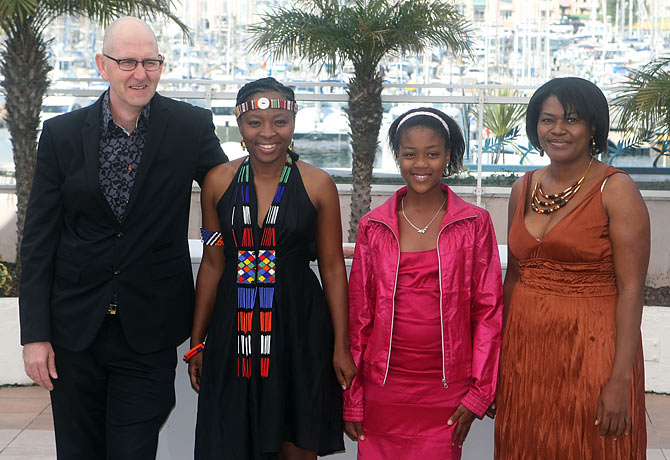
Director Oliver Schmitz, left, and actresses Lerato Mvelase, Khomotso Manyaka and Harriet Manamela pose during a photo call for the film Life, Above All, at the 63rd international film festival, in Cannes.
Mick Jagger, Marion Cotillard, Russell Crowe, Jennifer Lopez, Paris Hilton, Alain Delon, Patti Smith, Gerard Butler, Grace Jones and Kristin Scott-Thomas were among the illuminati attending Thursday night's 17th Cinema Against AIDS banquet. Held each year at Cannes to benefit the charity AmfAR, which has raised more than $300 million for AIDS research and treatment, the event always boasts the festival's highest density of stars. At the first party in 1994, chairwoman Elizabeth Taylor presided, and Sharon Stone was the spirited auctioneer. At last night's auction, held at the Eden Roc restaurant at the meta-posh Hotel du Cap a half-hour down the Riviera from Cannes, high bidders could win a day with Bill Clinton, or a cameo role in a film with Hugh Jackman and Kate Winslet. Bidding escalated into the hundreds of thousands — Euros or dollars? Either way, the AmfAR bash made quite a haul for an excellent cause.
Back here at the Palais des Festivals, where we worker-bee critics watch films all day instead of schmoozing with celebrities, the most warmly acclaimed film was a film that deals, first subtly, then openly, with the tragedy of AIDS in South Africa. Life, Above All. And, with due respect to the stars who decorated the Croisette and showed up at the AmfAR dinner, the unqualified heroine of this year's festival is Chanda, the 12-year-old girl at the center of the film — with honorable mention going to the luminous Khomotso Manyaka, the South African girl who, in her first role, inhabits this wise child with such power and dignity. Alone among the films here, this was one that had critics cheering like schoolkids, in a 10-minute standing ovation, and wiping tears from their gimlet eyes. Last year the film that had that emotional effect was Precious; Life, Above All deserves the same wide release and at least as much acclaim.
Chanda (Khomotso Manyaka), who lives in a lower-middle-class town near Johannesburg, is a serious, studious child and the only responsible person in her family — a family dissolving and decaying in front of her. Her baby sister Sarah has just died. Her mother Lilian (Lerato Mvelase) is ill with an unspecified disease, and suspected of poisoning the child with her breast milk. Her stepfather Jonah (Audrey Poolo) is a wandering, philandering drunk. Her best friend Esther (Keaobaka Makanyane), an outcast in the township, is suspected of selling her young body to the local truckers. And next-door neighbor Madame Tafa (Tinah Mnumzana) heaps her disapproval on the whole family. Like the Old Testament's Job, Chanda struggles under the weight of all these calamities, but she doesn't buckle. She shoulders the burden and carries on: buying a coffin for Sarah, searching for her missing stepfather, trying to get medical attention for her mother, bringing Esther to live in her home, and mothering her younger half-siblings.
The secret horror destroying Chanda's family — neighbors call it "the disease" — is AIDS. The father passed it on to his wife, the wife to the baby Sarah, and all three are mortally afflicted. The townspeople know to condemn people with AIDS but not how to fight the plague. They try to ward it off with the magic and superstition that they have used for centuries. They consult a shamaness, who produces a snake from a woman's body; they visit a "doctor," who is actually a pharmaceutical salesman; they sing a gospel chorale; finally they exile the sick to die out on the plains. When Chanda presses Madame Tafa about Lilian's disappearance, the older woman says, "We hid her where the disease won't harm the family." The local hospital is overwhelmed with patients; no room for another AIDS sufferer. So Chanda goes on an odyssey to find, help and perhaps heal her mother.
The movie — based on Canadian novelist Allan Stratton's young-adult award-winner Chanda's Secrets, scripted by Detroit-born novelist and playwright Dennis Foon and directed by Oliver Schmitz, a white South African — is in a way a Frank Capra re-do of the Precious theme. Chanda is every bit as resourceful as Precious was pathetic and helpless. In true Capra fashion she must undergo the miseries and public condemnation of a Jefferson Smith or George Bailey, before enjoying a (not entirely probable) reprieve from the townsfolk who ostracized her. But Chanda doesn't really need communal validation; self-doubt rarely hobbles her resolve. She believes in herself, and in the saving value of her friendship with Esther.
Schmitz uses the wide-screen frame smartly, often to isolate Chanda from her naysayers, occasionally to create dynamic intimacy between Chanda and those she loves and wants to save. Life, Above All has the high art and big heart of any award-worthy film. One has to ask why it was relegated to the sidebar Un Certain Regard program rather than being placed in the main competition, eligible for Cannes' top prize, to be announced Sunday night. Whatever film does win the Palme d'Or, it will receive publicity galore and probably be released in the U.S. But we would be surprised if it has the audience appeal and gut impact of this tale about a strong little girl fighting to keep her family alive and together.